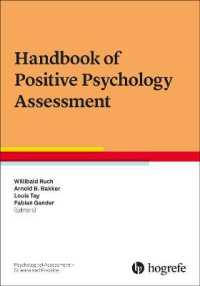- ホーム
- > 洋書
- > 英文書
- > Science / Mathematics
Full Description
Complex Automated Negotiations have been widely studied and are becoming an important, emerging area in the field of Autonomous Agents and Multi-Agent Systems. In general, automated negotiations can be complex, since there are a lot of factors that characterize such negotiations. These factors include the number of issues, dependency between issues, representation of utility, negotiation protocol, negotiation form (bilateral or multi-party), time constraints, etc. Software agents can support automation or simulation of such complex negotiations on the behalf of their owners, and can provide them with adequate bargaining strategies. In many multi-issue bargaining settings, negotiation becomes more than a zero-sum game, so bargaining agents have an incentive to cooperate in order to achieve efficient win-win agreements. Also, in a complex negotiation, there could be multiple issues that are interdependent. Thus, agent's utility will become more complex than simple utility functions. Further, negotiation forms and protocols could be different between bilateral situations and multi-party situations. To realize such a complex automated negotiati on, we have to incorporate advanced Artificial Intelligence technologies includes search, CSP, graphical utility models, Bays nets, auctions, utility graphs, predicting and learning methods. Applications could include e-commerce tools, decisionmaking support tools, negotiation support tools, collaboration tools, etc.
These issues are explored by researchers from different communities in Autonomous Agents and Multi-Agent systems. They are, for instance, being studied in agent negotiation, multi-issue negotiations, auctions, mechanism design, electronic commerce, voting, secure protocols, matchmaking & brokering, argumentation, and co-operation mechanisms. This book is also edited from some aspects of negotiation researches including theoretical mechanism design of trading based on auctions, allocation mechanismbased on negotiation among multi-agent, case-study and analysis of automated negotiations, data engineering issues in negotiations, and so on.
Contents
The Prediction of Partners' Behaviors in Self-interested Agents.- Sequential Auctions for Common Value Objects with Budget Constrained Bidders.- A Comparative Study of Argumentation- and Proposal-Based Negotiation.- The Blind Leading the Blind: A Third-Party Model for Bilateral Multi-issue Negotiations under Incomplete Information.- Using Clustering Techniques to Improve Fuzzy Constraint Based Automated Purchase Negotiations.- Assess Your Opponent: A Bayesian Process for Preference Observation in Multi-attribute Negotiations.- Designing Risk-Averse Bidding Strategies in Sequential Auctions for Transportation Orders.- CPN-Based State Analysis and Prediction for Multi-agent Scheduling and Planning.- Adaptive Commitment Management Strategy Profiles for Concurrent Negotiations.- Analyses of Task Allocation Based on Credit Constraints.- Erratum: The Prediction of Partners' Behaviors in Self-interested Agents.






